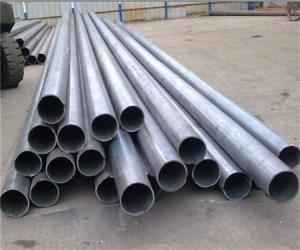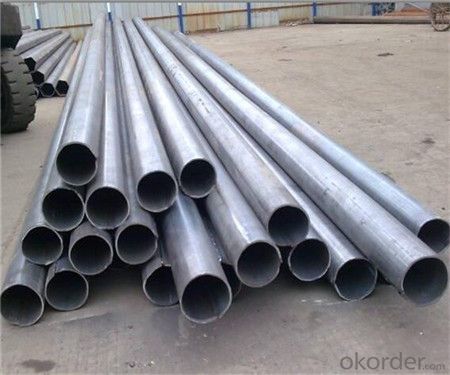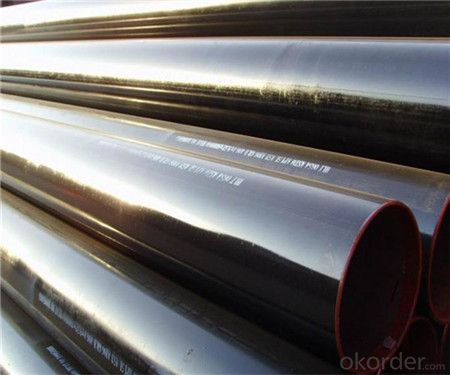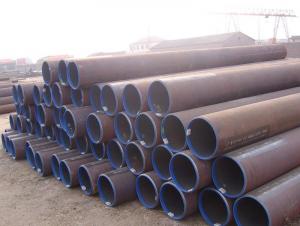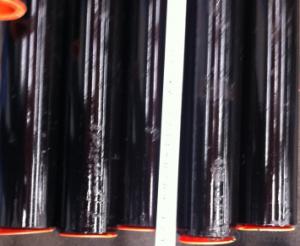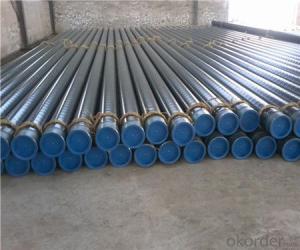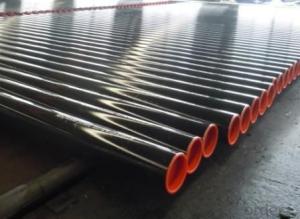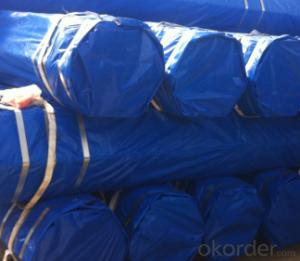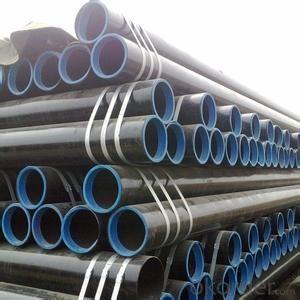ERW Steel Pipe with API 5L, ASTM A53 Standard
- Loading Port:
- Tianjin
- Payment Terms:
- TT or LC
- Min Order Qty:
- 25 m.t.
- Supply Capability:
- 15000 m.t./month
OKorder Service Pledge
OKorder Financial Service
You Might Also Like
1、Structure of ERW Steel Pipe with API 5L, ASTM A53 Standard:
Seamless pipe is formed by drawing a solid billet over a piercing rod to create the hollow shell. As the manufacturing process does not include any welding, seamless pipes are perceived to be stronger and more reliable. Historically seamless pipe was regarded as withstanding pressure better than other types, and was often more easily available than welded pipe.
2、Main Features of ERW Steel Pipe with API 5L, ASTM A53 Standard:
• High manufacturing accuracy
• High strength
• Small inertia resistance
• Strong heat dissipation ability
• Good visual effect
• Reasonable price
3、ERW Steel Pipe with API 5L, ASTM A53 Standard Specification:
Standard | GB, DIN, ASTM ASTM A106-2006, ASTM A53-2007 |
Grade | 10#-45#, 16Mn 10#, 20#, 45#, 16Mn |
Thickness | 8 - 33 mm |
Section Shape | Round |
Outer Diameter | 133 - 219 mm |
Place of Origin | Shandong, China (Mainland) |
Secondary Or Not | Non-secondary |
Application | Hydraulic Pipe |
Technique | Cold Drawn |
Certification | API |
Surface Treatment | factory state or painted black |
Special Pipe | API Pipe |
Alloy Or Not | Non-alloy |
Length | 5-12M |
Outer Diameter | 21.3-610mm |
Grade | 20#, 45#, Q345, API J55, API K55, API L80, API N80, API P110, A53B |
Standard | ASME, ASTM |
1) Material:20#(ASTM A 106/A53 GRB.API5LGRB,GB),45#,16Mn,10#.
2) Specification range:OD:21.3-610mm,WT:6-70mm,length:6-12m or according to the requirement of clients.
3) Excutive standards:GB,ASME API5L.ASTM A 106/A53,Despite of the above standards,we can also supply seamless steel pipe with standard of DIN,JIS,and so on,and also develop new products according to the requirements of our clients!
4) Surface:black lacquered,varnish coating or galvanized.
5) Ends:Beveled or square cut,plastic capped,painted.
6) Packing:bundles wrapped with strong steel strip,seaworthy packing.
4、Packaging & Delivery
Packaging Details: | seaworthy package,bundles wrapped with strong steel strip |
Delivery Detail: | 15-30days after received 30%TT |
5、FAQ of ERW Steel Pipe with API 5L, ASTM A53 Standard:
①How is the quality of your products?
Our products are manufactured strictly according to national and internaional standard, and we take a test
on every pipe before delivered out. If you want see our quality certifications and all kinds of testing report, please just ask us for it.
Guaranteed: If products’ quality don’t accord to discription as we give or the promise before you place order, we promise 100% refund.
②How about price?
Yes, we are factory and be able to give you lowest price below market one, and we have a policy that “ for saving time and absolutely honest business attitude, we quote as lowest as possible for any customer, and discount can be given according to quantity”,if you like bargain and factory price is not low enough as you think, just don’t waste your time.Please trust the quotation we would give you, it is professional one.
③Why should you chose us?
Chose happens because of quality, then price, We can give you both.Additionally, we can also offer professional products inquiry, products knowledge train(for agents), smooth goods delivery, exellent customer solution proposals.Our service formula: good quality+good price+good service=customer’s trust
SGS test is available, customer inspection before shipping is welcome, third party inspection is no problem.
6.Images
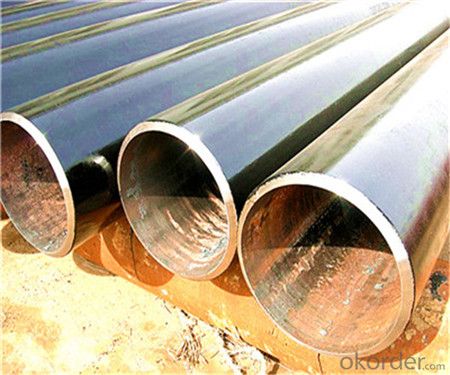
- Q: Can steel pipes be used for the construction of high-rise buildings?
- Yes, steel pipes can be used for the construction of high-rise buildings. Steel pipes offer several advantages such as high strength, durability, and resistance to fire and corrosion. They can be used for various structural elements including columns, beams, and bracing systems, providing a reliable and cost-effective solution for constructing tall buildings.
- Q: What are the factors that affect the lifespan of steel pipes in different environments?
- The factors that affect the lifespan of steel pipes in different environments include exposure to corrosive substances, temperature fluctuations, water quality, and mechanical stress.
- Q: How are steel pipes used in the pulp and paper industry?
- Steel pipes are commonly used in the pulp and paper industry for various applications such as transporting water, steam, chemicals, and other fluids throughout the production process. They are used in the construction of pipelines, conveying raw materials, and transferring finished products. Steel pipes provide durability, reliability, and resistance to corrosion, making them suitable for handling the harsh conditions and corrosive substances found in the industry.
- Q: How do steel pipes handle vibrations?
- The effectiveness of handling vibrations is a well-known attribute of steel pipes. Their strong and rigid nature enables them to withstand various types of vibrations, including mechanical vibrations and seismic activities. The structural integrity and strength of steel pipes are responsible for their resilience. Steel pipes possess high tensile strength, which allows them to resist deformation or breakage when exposed to vibrations. They also exhibit resistance to fatigue, meaning they can endure repeated vibrations without suffering significant damage. This quality makes steel pipes ideal for applications involving constant or cyclic vibrations, such as in industrial settings or for fluid transportation through pipelines. Furthermore, steel pipes have the added advantage of being able to dampen vibrations due to their mass. The weight of the steel pipe aids in absorbing and dissipating the energy generated by vibrations, preventing excessive movement or oscillation. This damping effect contributes to the overall stability and durability of the pipe system. Various measures can be taken to further enhance the ability of steel pipes to handle vibrations. These measures may include the utilization of vibration isolators or dampers, which are devices designed to reduce the transmission of vibrations from the surrounding environment. Additionally, proper installation techniques and regular maintenance can help ensure that steel pipes continue to function optimally under conditions prone to vibrations. In conclusion, steel pipes possess the necessary attributes to effectively handle vibrations, including strength, resistance to fatigue, and the ability to dampen vibrations. Their robustness and durability make them a reliable choice for applications where vibrations are a concern, guaranteeing the safe and efficient transportation of fluids or materials.
- Q: How are steel pipes used in the manufacturing of renewable energy systems?
- Steel pipes are widely used in the manufacturing of renewable energy systems due to their durability, strength, and versatility. They are commonly used in the construction of wind turbines, solar panels, and geothermal systems. Steel pipes are used as support structures for wind turbine towers, providing stability and withstanding harsh weather conditions. In solar panel systems, steel pipes are used as frames to hold the panels in place, ensuring their proper alignment and stability. Additionally, steel pipes are used in geothermal systems to transport hot water or steam from underground reservoirs to the surface for electricity generation. Overall, steel pipes play a crucial role in the manufacturing of renewable energy systems, contributing to their efficiency and longevity.
- Q: How are steel pipes used in the manufacturing of machinery and equipment?
- Steel pipes are widely used in the manufacturing of machinery and equipment due to their numerous beneficial properties. These pipes are primarily used for conveying various materials, fluids, and gases within the machinery, providing a safe and efficient means of transportation. One of the key uses of steel pipes in machinery manufacturing is in the process of hydraulic and pneumatic systems. Hydraulic systems rely on steel pipes to transmit power and control fluid flow, while pneumatic systems use these pipes to convey compressed air to power various components. The strength and durability of steel pipes ensure that they can withstand the high pressure and forces exerted by these systems, making them a reliable choice for such applications. Additionally, steel pipes are used in the construction of machinery frames and structures. Their high tensile strength and resistance to corrosion make them ideal for providing structural support and stability to heavy machinery. These pipes can be easily welded, bent, and fabricated into various shapes, allowing for flexibility in design and enabling the creation of complex machinery structures. Furthermore, steel pipes play a vital role in the transportation of raw materials and finished products within the manufacturing process. They are commonly used as conduits for the movement of liquids, gases, and granular materials, facilitating the smooth operation of machinery and equipment. Steel pipes are particularly suitable for handling abrasive and corrosive materials, as their robust construction ensures minimal wear and tear over time. In summary, steel pipes are extensively used in the manufacturing of machinery and equipment due to their strength, durability, and versatility. Whether it is for hydraulic systems, structural support, or material transportation, steel pipes are an integral component that contributes to the efficiency and reliability of machinery in various industries.
- Q: How are steel pipes measured and categorized?
- Steel pipes are typically measured and categorized based on their outer diameter (OD) and wall thickness. The OD is measured in inches or millimeters, while the wall thickness is measured in inches or centimeters. Pipes are further categorized based on their schedule, which refers to the wall thickness and determines the pressure rating of the pipe. The schedule is denoted by a letter or number, such as Schedule 40 or Sch 80. These measurements and categorizations help in selecting the appropriate steel pipe for different applications and ensure compatibility with fittings and other components.
- Q: What are the disadvantages of using steel pipes?
- One major disadvantage of using steel pipes is their susceptibility to corrosion. Over time, exposure to moisture and certain chemicals can cause the steel to rust, leading to structural weakness and potential leaks. Another drawback is the high cost of steel pipes compared to alternative materials such as plastic or copper. Additionally, steel pipes are relatively heavy and can be challenging to handle and transport.
- Q: Are steel pipes resistant to earthquakes?
- Steel pipes are generally considered to be more resistant to earthquakes compared to other materials such as concrete or PVC pipes. This is due to the inherent properties of steel, which include its high tensile strength and flexibility. During an earthquake, steel pipes can absorb and distribute the seismic energy more effectively, allowing them to better withstand the shaking and ground movements. Additionally, steel pipes have the ability to deform without rupturing or collapsing, minimizing the risk of structural failure. However, it is important to note that the earthquake resistance of steel pipes ultimately depends on various factors such as the design, installation, and overall structural integrity of the piping system. Proper engineering and construction practices should be followed to ensure the highest level of earthquake resistance for steel pipes.
- Q: Are steel pipes suitable for use in nuclear power plants?
- Yes, steel pipes are suitable for use in nuclear power plants. They are commonly used in various systems such as cooling, steam, and reactor coolant systems due to their high strength, durability, and resistance to corrosion. Additionally, steel pipes can withstand the high pressure and temperature conditions present in nuclear power plants, making them a reliable choice for this critical infrastructure.
Send your message to us
ERW Steel Pipe with API 5L, ASTM A53 Standard
- Loading Port:
- Tianjin
- Payment Terms:
- TT or LC
- Min Order Qty:
- 25 m.t.
- Supply Capability:
- 15000 m.t./month
OKorder Service Pledge
OKorder Financial Service
Similar products
Hot products
Hot Searches
Related keywords
